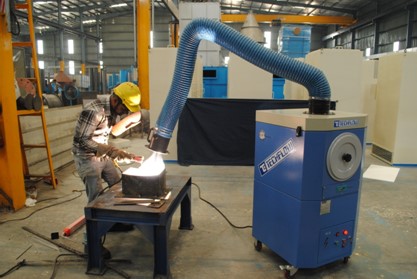Maintaining optimal operating conditions in workshops is crucial for both productivity and safety. Dust collectors play an essential role in this regard by controlling and removing airborne dust and particulate matter. These systems are designed to enhance air quality, safeguard equipment, and improve the overall work environment. Here is how dust collectors contribute to maintaining optimal conditions in workshops.
Improved Air Quality
One of the primary benefits of dust collectors is their ability to significantly improve air quality. Workshops often deal with materials that generate fine dust particles, such as wood, metal, plastic, or composite materials. These particles can become airborne and pose serious health risks if inhaled, including respiratory issues, allergic reactions, and long-term lung diseases. Dust collectors efficiently capture and filter out these particles, ensuring that the air remains clean and safe for workers. By maintaining a healthy air quality, dust collectors help reduce absenteeism due to health problems, thus enhancing overall productivity and check here now www.tysum.com.

Enhanced Worker Safety
Dust collectors contribute to a safer working environment by mitigating hazards associated with dust accumulation. In addition to respiratory risks, dust can create slippery surfaces, increasing the likelihood of slips and falls. Furthermore, certain dust types, particularly those from metal and wood, are highly flammable and can pose a fire or explosion risk if not properly managed. By collecting and containing dust, these systems minimize the chances of accidents, thereby fostering a safer workplace.
Protection of Equipment
Workshops often house various machines and tools that are sensitive to dust. Accumulated dust can infiltrate machinery, leading to increased wear and tear, blockages, and mechanical failures. Dust collectors prevent dust from settling on or inside equipment, thus prolonging the lifespan of the machinery and reducing maintenance costs. This protection is vital for ensuring that equipment operates efficiently and without unexpected downtimes, which can disrupt workflow and productivity.
Enhanced Productivity and Efficiency
A clean and well-maintained workshop is synonymous with high productivity and efficiency. Dust can obscure markings, interfere with assembly processes, and contaminate products, leading to errors and defects. By keeping the work environment free from dust, these systems ensure that workers can focus on their tasks without interruptions or the need for constant cleaning. This leads to smoother operations, higher-quality products, and increased output.
Improved Employee Morale
Employee morale is directly influenced by the quality of the work environment. A clean, safe, and comfortable workspace fosters a positive atmosphere, which can enhance job satisfaction and motivation. Workers are likely to feel valued and cared for when their health and safety are prioritized. This positive morale translates into better performance, lower turnover rates, and a more cohesive team and how does osha enforce its standards.
Energy Efficiency
Modern dust collectors are designed with energy efficiency in mind. These systems often include advanced filtration technologies and automated controls that optimize performance while minimizing energy consumption. By investing in energy-efficient dust collection systems, workshops can reduce their overall energy costs and contribute to environmental sustainability.
Dust collectors are indispensable for maintaining optimal operating conditions in workshops. They improve air quality, enhance worker safety, protect equipment, ensure regulatory compliance, boost productivity, and elevate employee morale. By implementing effective dust collection systems, workshops can create a cleaner, safer, and more efficient working environment, ultimately leading to better operational outcomes and a more sustainable future.



